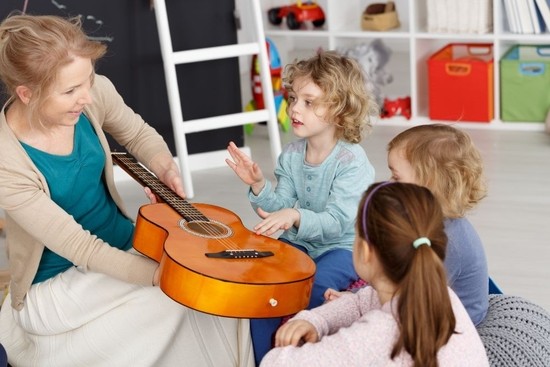Children learn aspects of music in utero. They learn to recognize the tone of their mother’s voice and they grow surrounded by her heartbeat. Music is integral to their brain development and can help them build motor skills over time.

Movement and Exercise
It is important to create a musical environment for your child. Turn on the tunes, any tunes, and kids will turn it into an excuse for a dance party. Join them! If they’re standing, they’ll wiggle their bottoms or wave their hands in the air. If they can stand unaided, they may want to hop or move hands and feet at the same time.
It’s important to note that girls may pick up on this earlier than boys. Girls develop the ability to maintain a steady beat at three; boys can struggle with this up to the age of five.
Dexterity
Even small children can build dexterity while making music. A bracelet that rattles and makes noise can be turned into a rhythm tool, while a toy xylophone can be hit with a mallet gripped in a small fist.
If your child shows an interest in the piano or guitar, seek out a teacher who can help them start to build both dexterity and muscle memory. Play chords for your child and help them to hear the tension in a half step between the black and white keys.
Movies
While there are great movie musicals written especially for kids, don’t miss out on the classic visual representations of classical music, the Fantasia Films. Older children could gain a great deal from studying the composers they enjoy. For example, watching Mickey struggle with the many buckets of water is fun, but what do any of us know about Paul Dukas, and why is the Sorcerer’s Apprentice such a rare piece? Paul Dukas was both a composer and an orchestrator. What are the differences between those two jobs? There is plenty to learn beyond just listening to music.
Community
As your child gets older, look for choral opportunities for them to enjoy. The process of making music in a group is very different from playing the piano or the guitar. Choral experience is especially important for little boys. They may see and know men who paint, but prior to puberty, boys need to learn to match pitch with the girls in their age group.
A boy who doesn’t learn to match pitch in childhood will have a lot of trouble learning to sing as an adult. Many adults think they’re tone-deaf when actually they just lack the ability to match pitch with the sounds they hear. Time in a children’s choir can help both boys and girls learn to match pitch with the sound around them.
The ability to vocalize on the pitch is good for children even if they don’t continue on in choir. The ability to read a line of music and vocalize it before you play it on an instrument can make brass instruments, in particular, much easier to manage.
Beauty
Well-performed music is beautiful. For an audience member, it can be extremely cathartic to hear a good player or singer perform to the best of their abilities. Musical instruments are also beautiful. While your child may start out on a beginner instrument, take time to show them what a professional plays. Visit a local guitar store, or talk to a violin maker.
Find a video on how a piano is constructed. Use all of this information to ask more questions. For example, Bo Diddley built his own guitars when he first started. What were they built of, and what was special about his playing? Keep your child engaged outside of just learning the chords of an instrument.
Music has long been a constant of the human experience. Many of the ancient texts available to us today were memorized as songs and later written down as poems. To help your child develop their natural musical talent, show them how much you enjoy both making and listening to music.

